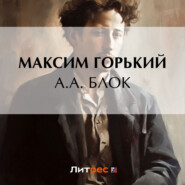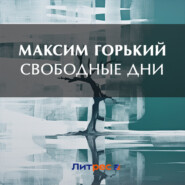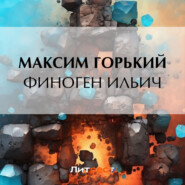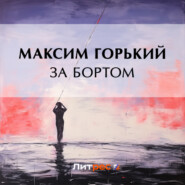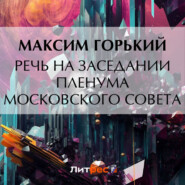По всем вопросам обращайтесь на: info@litportal.ru
(©) 2003-2025.
✖
Through Russia
Настройки чтения
Размер шрифта
Высота строк
Поля
Personally, however, I had no desire to converse with him, for his frozen eyes chilled and repelled me and from the moment when I had approached him, and seen him fold his hands behind him, and recoil a step as he inquired with suppressed sternness, "What do you want?" there had fallen away from me all further ambition to learn the nature of the songs which he sang.
The ex-soldier gazed at him resentfully, then said with an oath:
"The old wizard and pilferer! Take my word for it that a lump of piety like that has got a pretty store put away somewhere."
Whereafter, as he lit his pipe and squinted in the direction of the carpenters, he added with stifled wrath:
"The airs that the 'elect' give themselves – the sons of bitches!"
"It is always so," commented Vasili with a resentment equal to the last speaker's. "Yes, no sooner, with us, does a man accumulate a little money than he sticks his nose in the air, and falls to thinking himself a real barin."
"Why is it that you always say 'With us,' and 'Among us,' and so on?"
"Among us Russians, then, if you like it better."
"I do like it better. For you are not a German, are you, nor a Tartar?"
"No. It is merely that I can see the faults in our Russian folk."
Upon that (not for the first time) the pair plunged into a discussion which had come so to weary them that now they spoke only indifferently, without effort.
"The word 'faults' is, I consider, an insult," began the ex-soldier as he puffed at his pipe. "Besides, you don't speak consistently. Only this moment I observed a change in your terms."
"To what?"
"To the term 'Russians.'"
"What should you prefer?"
A new sound floated into the defile as from some point on the steppe the sound of a bell summoning folk to the usual Saturday vigil service. Removing his pipe from his mouth, the ex-soldier listened for a moment or two. Then, at the third and last stroke of the bell, he doffed his cap, crossed himself with punctilious piety, and said:
"There are not very many churches in these parts."
Whereafter he threw a glance across the river, and added venomously:
"Those devils THERE don't cross themselves, the accursed Serbs!"
Vasili looked at him, twisted a left-hand moustache, smoothed it again, regarded for a moment the sky and the defile, and sank his head.
"The trouble with me," he remarked in an undertone, "is that I can never remain very long in one place – always I keep fancying that I shall meet with better things elsewhere, always I keep hearing a bird singing in my heart, 'Do you go further, do you go further.'"
"That bird sings in the heart of EVERY man," the ex-soldier growled sulkily.
With a glance at us both, Vasili laughed a subdued laugh.
"'In the heart of every man'?" he repeated. "Why, such a statement is absurd. For it means, does it not, that every one of us is an idler, every one of us is constantly waiting for something to turn up – that, in fact, no one of us is any better than, or able to do any better than, the folk whose sole utterance is 'Give unto us, pray give unto us'? Yes, if that be the case, it is an unfortunate case indeed!"
And again he laughed. Yet his eyes were sorrowful, and as the fingers of his right hand lay upon his knee they twitched as though they were longing to grasp something unseen.
The ex-soldier frowned and snorted. For my own part, however, I felt troubled for, and sorry for, Vasili. Presently he rose, broke into a soft whistle, and moved away by the side of the stream.
"His head is not quite right," muttered the ex-soldier as he winked in the direction of the retreating figure. "Yes, I tell you that straight, for from the first it was clear to me. Otherwise, what could his words in depredation of Russia mean, when of Russia nothing the least hard or definite can be said? Who really knows her? What is she in reality, seeing that each of her provinces is a soul to itself, and no one could state which of the two Holy Mothers stands nearest to God – the Holy Mother of Smolensk, or the Holy Mother of Kazan?"
For a while the speaker sat scraping greasy deposit from the bottom and sides of the kettle; and all that while he grumbled as though he had a grudge against someone. At length, however, he assumed an attitude of attention, with his neck stretched out as though to listen to some sound.
"Hist!" was his exclamation.
What then followed, followed as unexpectedly as when, like an evil bird, a summer whirlwind suddenly sweeps up from the horizon, and discharges a bluish-black cloud in torrents of rain and hail, until everything is overwhelmed and battered to mud.
That is to say, with much din of whistling and other sounds there now came pouring into the defile, and began to ascend the trail beside the stream, a straggling procession of some thirty workmen with, gleaming dully in the hands of their leading files, flagons of vodka, and, suspended on the backs and shoulders of others, wallets and bags of bread and other comestibles, and, in two instances, poised on the heads of yet other processionists, large black cauldrons the effect of which was to make their bearers look like mushrooms.
"A vedro [2 3/4 gallons] and a half to the cauldron!" whispered the ex-soldier with a computative grunt as he gained his feet.
"Yes, a vedro and a half," he repeated. As he spoke the tip of his tongue protruded until it rested on the under-lip of his half-opened mouth. In his face there was a curiously thirsty, gross expression, and his attitude, as he stood there, was that of one who had just received a blow, and was about to cry out in consequence.
Meanwhile the defile rumbled like a barrel into which heavy weights are being dropped, for one of the newcomers was beating an empty tin pail, and another one whistling in a manner the tossed echoes of which drowned even the rivulet's murmur as nearer and nearer came the mob of men, a mob clad variously in black, grey, or russet, with sleeves rolled up, and heads, in many cases, bare save for their own towsled, dishevelled locks, and bodies bent with fatigue, or carried stumblingly along on legs bowed outwards. Meanwhile, as the dull, polyphonous roar of voices swept through the neck of the defile, a man shouted in broken, but truculent, accents:
"I say no! Fiddlesticks! Not a man is there who could drink more than a vedro of 'blood-and-sweat' in a day."
"A man could drink a lake of it."
"No, a vedro and a half. That is the proper reckoning."
"Aye, a vedro and a half." And the ex-soldier, as he repeated the words, spoke both as though he were an expert in the matter and as though he felt for the matter a touch of respect. Then, lurching forward like a man pushed by the scruff of the neck, he crossed the rivulet, intercepted the crowd, and became swallowed up in its midst.
Around the barraque the carpenters (the foreman ever glimmering among them) were hurriedly collecting tools. Presently Vasili returned – his right hand thrust into his pocket, and his left holding his cap.
"Before long those fellows will be properly drunk!" he said with a frown. "Ah, that vodka of ours! It is a perfect curse!" Then to me: "Do YOU drink?"
"No," I replied.
"Thank God for that! If one does not drink one will never really get into trouble."
For a moment he gazed gloomily in the direction of the newcomers. Then he said without moving, without even looking at me:
"You have remarkable eyes, young fellow. Also, they seem familiar to me – I have seen them somewhere before. Possibly that happened in a dream, though I cannot be sure. Where do you come from?"
I answered, but, after scanning me perplexedly, he shook his head.
"No," he remarked. "I have never visited that part of the country, or indeed, been so far from home."
"But this place is further still?"
"Further still?"
"Yes – from Kursk."
He laughed.
The ex-soldier gazed at him resentfully, then said with an oath:
"The old wizard and pilferer! Take my word for it that a lump of piety like that has got a pretty store put away somewhere."
Whereafter, as he lit his pipe and squinted in the direction of the carpenters, he added with stifled wrath:
"The airs that the 'elect' give themselves – the sons of bitches!"
"It is always so," commented Vasili with a resentment equal to the last speaker's. "Yes, no sooner, with us, does a man accumulate a little money than he sticks his nose in the air, and falls to thinking himself a real barin."
"Why is it that you always say 'With us,' and 'Among us,' and so on?"
"Among us Russians, then, if you like it better."
"I do like it better. For you are not a German, are you, nor a Tartar?"
"No. It is merely that I can see the faults in our Russian folk."
Upon that (not for the first time) the pair plunged into a discussion which had come so to weary them that now they spoke only indifferently, without effort.
"The word 'faults' is, I consider, an insult," began the ex-soldier as he puffed at his pipe. "Besides, you don't speak consistently. Only this moment I observed a change in your terms."
"To what?"
"To the term 'Russians.'"
"What should you prefer?"
A new sound floated into the defile as from some point on the steppe the sound of a bell summoning folk to the usual Saturday vigil service. Removing his pipe from his mouth, the ex-soldier listened for a moment or two. Then, at the third and last stroke of the bell, he doffed his cap, crossed himself with punctilious piety, and said:
"There are not very many churches in these parts."
Whereafter he threw a glance across the river, and added venomously:
"Those devils THERE don't cross themselves, the accursed Serbs!"
Vasili looked at him, twisted a left-hand moustache, smoothed it again, regarded for a moment the sky and the defile, and sank his head.
"The trouble with me," he remarked in an undertone, "is that I can never remain very long in one place – always I keep fancying that I shall meet with better things elsewhere, always I keep hearing a bird singing in my heart, 'Do you go further, do you go further.'"
"That bird sings in the heart of EVERY man," the ex-soldier growled sulkily.
With a glance at us both, Vasili laughed a subdued laugh.
"'In the heart of every man'?" he repeated. "Why, such a statement is absurd. For it means, does it not, that every one of us is an idler, every one of us is constantly waiting for something to turn up – that, in fact, no one of us is any better than, or able to do any better than, the folk whose sole utterance is 'Give unto us, pray give unto us'? Yes, if that be the case, it is an unfortunate case indeed!"
And again he laughed. Yet his eyes were sorrowful, and as the fingers of his right hand lay upon his knee they twitched as though they were longing to grasp something unseen.
The ex-soldier frowned and snorted. For my own part, however, I felt troubled for, and sorry for, Vasili. Presently he rose, broke into a soft whistle, and moved away by the side of the stream.
"His head is not quite right," muttered the ex-soldier as he winked in the direction of the retreating figure. "Yes, I tell you that straight, for from the first it was clear to me. Otherwise, what could his words in depredation of Russia mean, when of Russia nothing the least hard or definite can be said? Who really knows her? What is she in reality, seeing that each of her provinces is a soul to itself, and no one could state which of the two Holy Mothers stands nearest to God – the Holy Mother of Smolensk, or the Holy Mother of Kazan?"
For a while the speaker sat scraping greasy deposit from the bottom and sides of the kettle; and all that while he grumbled as though he had a grudge against someone. At length, however, he assumed an attitude of attention, with his neck stretched out as though to listen to some sound.
"Hist!" was his exclamation.
What then followed, followed as unexpectedly as when, like an evil bird, a summer whirlwind suddenly sweeps up from the horizon, and discharges a bluish-black cloud in torrents of rain and hail, until everything is overwhelmed and battered to mud.
That is to say, with much din of whistling and other sounds there now came pouring into the defile, and began to ascend the trail beside the stream, a straggling procession of some thirty workmen with, gleaming dully in the hands of their leading files, flagons of vodka, and, suspended on the backs and shoulders of others, wallets and bags of bread and other comestibles, and, in two instances, poised on the heads of yet other processionists, large black cauldrons the effect of which was to make their bearers look like mushrooms.
"A vedro [2 3/4 gallons] and a half to the cauldron!" whispered the ex-soldier with a computative grunt as he gained his feet.
"Yes, a vedro and a half," he repeated. As he spoke the tip of his tongue protruded until it rested on the under-lip of his half-opened mouth. In his face there was a curiously thirsty, gross expression, and his attitude, as he stood there, was that of one who had just received a blow, and was about to cry out in consequence.
Meanwhile the defile rumbled like a barrel into which heavy weights are being dropped, for one of the newcomers was beating an empty tin pail, and another one whistling in a manner the tossed echoes of which drowned even the rivulet's murmur as nearer and nearer came the mob of men, a mob clad variously in black, grey, or russet, with sleeves rolled up, and heads, in many cases, bare save for their own towsled, dishevelled locks, and bodies bent with fatigue, or carried stumblingly along on legs bowed outwards. Meanwhile, as the dull, polyphonous roar of voices swept through the neck of the defile, a man shouted in broken, but truculent, accents:
"I say no! Fiddlesticks! Not a man is there who could drink more than a vedro of 'blood-and-sweat' in a day."
"A man could drink a lake of it."
"No, a vedro and a half. That is the proper reckoning."
"Aye, a vedro and a half." And the ex-soldier, as he repeated the words, spoke both as though he were an expert in the matter and as though he felt for the matter a touch of respect. Then, lurching forward like a man pushed by the scruff of the neck, he crossed the rivulet, intercepted the crowd, and became swallowed up in its midst.
Around the barraque the carpenters (the foreman ever glimmering among them) were hurriedly collecting tools. Presently Vasili returned – his right hand thrust into his pocket, and his left holding his cap.
"Before long those fellows will be properly drunk!" he said with a frown. "Ah, that vodka of ours! It is a perfect curse!" Then to me: "Do YOU drink?"
"No," I replied.
"Thank God for that! If one does not drink one will never really get into trouble."
For a moment he gazed gloomily in the direction of the newcomers. Then he said without moving, without even looking at me:
"You have remarkable eyes, young fellow. Also, they seem familiar to me – I have seen them somewhere before. Possibly that happened in a dream, though I cannot be sure. Where do you come from?"
I answered, but, after scanning me perplexedly, he shook his head.
"No," he remarked. "I have never visited that part of the country, or indeed, been so far from home."
"But this place is further still?"
"Further still?"
"Yes – from Kursk."
He laughed.












